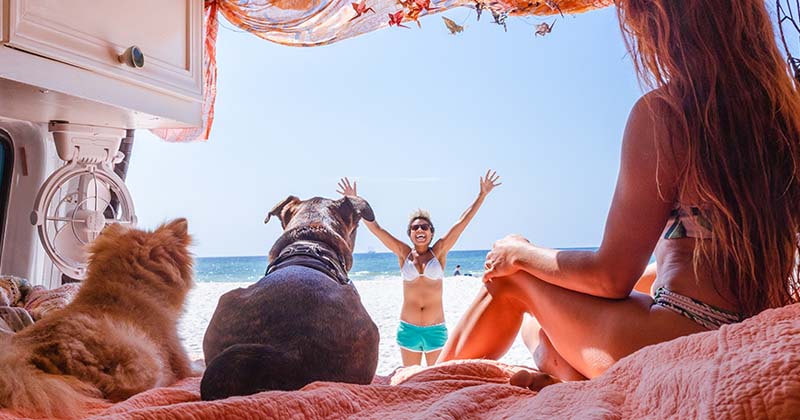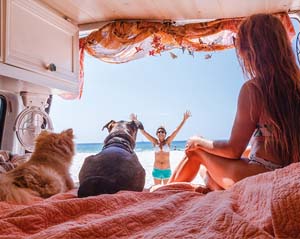In this month’s blog, we make a comparison between Reporting as a Service and choosing to live in a van.
What…?!? It’s actually a lot more clear than you think.

Over the last few years, I’ve noticed a growing trend where some, who have had the opportunity to do so, have shunned the trappings of the rat-race and chosen an alternative lifestyle instead. One that’s ‘off-grid’. One that requires minimal possessions and a view that life can be equally as fulfilling, probably more so, without a house, a kitchen, rent, mortgage, utility bills, and so forth. They call it #vanlife. They sleep, cook, eat, live, often work (where their profession allows) from a single vehicle – usually a Mercedes Sprinter, or VW Crafter and I find it really interesting.
If you’re a regular reader of our blogs, you’ll think that might be because I’m a bit of a petrol-head, but I suspect its due to a tiny bit of wanderlust brought on by a relative lack of movement over the last 18 months and perhaps even jealousy that I don’t really have the flexibility to do the same myself. They move about freely. They power the kit in their van, and their phones and laptops with solar energy. They base themselves where they want to be, rather than where they must be, and I think generally – free from the burden of possessions and commitment – have a really good time.
I just did a quick internet search and read about a couple from Durham who lived in their van for six years (as of November 2020) and plan to continue to do so and that seems…well, they must be very close. Could I do that? I don’t know, but when I read about them and others like them, I read about their feelings of freedom and independence and the bohemian lifestyle they extol, and I really admire it.
However, I also think it’s a bit idealistic and dare I say, naive.
Such freedom isn’t independently achieved. The “off-grid” claim is really only related to energy supply – and even then, they still have to carry bottled gas and water and I assume they do have a home address somewhere for legal purposes too. I don’t doubt for a second that a lack of possessions changes the way you behave and feel but I’d suggest that rather than directly causing a change in attitude, it’s the resulting change of incumbrance that truly does that.
“Vanlifers” share an infrastructure with others. They share roads, shops, camping locations, drainage etc. Where necessary, they need to visit mechanics for maintenance and MOT purposes and frequently visit garages for fuel. Some will use a Satnav and subscribe to Apps for entertainment and work, and I imagine there’s a heck of a lot of support leveraged in that community too. I do suspect the whole “off-grid” thing is a bit exaggerated.
However, it’s clear that by decreasing possessions and limiting contractual relationships to those that clearly and definitely add value, you are able to focus on those things that matter most and that might be their secret.
I see it everywhere. Take Wagamama and Yo! Sushi for example. When they opened in the 1990s, I remember several conversations where reluctance to share tables, belt-to-table delivery, or food delivered according to readiness rather than in a defined and timed ‘order’ was clearly expressed. The restaurants dispensed with processes and the ‘norms’ that didn’t add value to their offering and focussed on those that did. They were encumbered by physical limitations and kitchen-to-table delivery, so they found a way around it. Today, no-one bats an eye.
We do that for our clients. We take away some of the burden an institution carries and allow them to focus on the processes that add value. Adopting the Reporting as a Service model contributes to the sense of freedom a vanlifer feels. Our clients are indeed unencumbered (at least in the client and investor report production process) and you only have to talk to them to hear how that feels. They have found time and resource to focus on the quality and content of their reports and servicing their clients, and not on building and maintaining the system that does the report production. In doing so, they removed a load of operational problems and over-head, unnecessary cost and inefficiency.
We’re re-defining client reporting with Reporting as a Service. With each new client, our model and beliefs are validated. We’re removing unnecessary processes, costs and effort for our clients and providing an efficient, cost effective and shared infrastructure that numerous clients now rely on. Like vanlife, a restaurant or wherever else you see it, it’s increasingly the preferred and proven choice.

